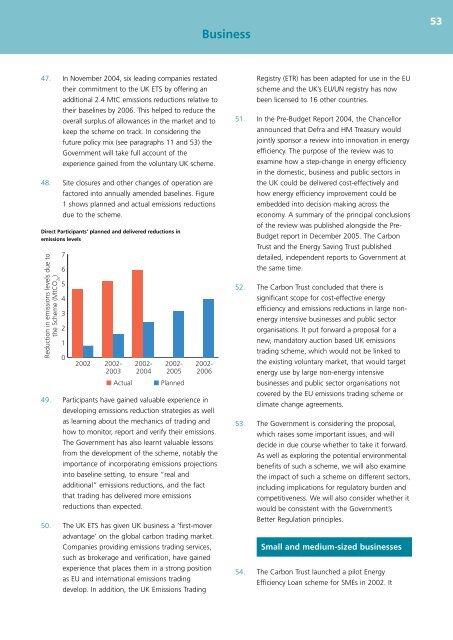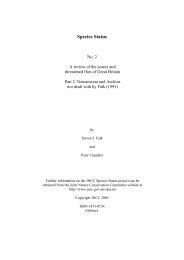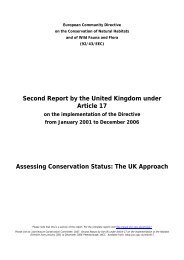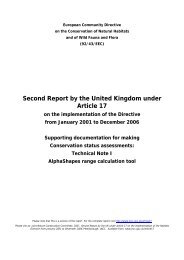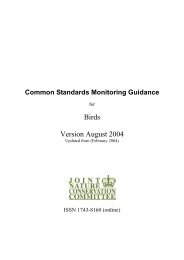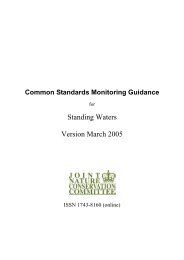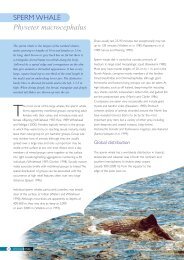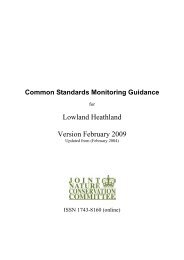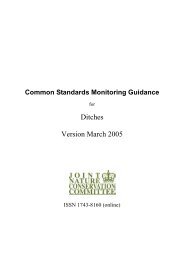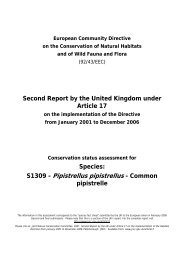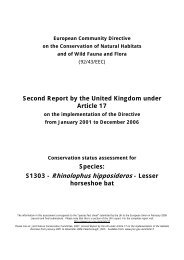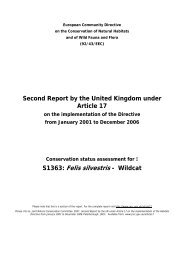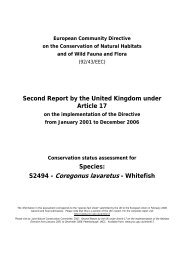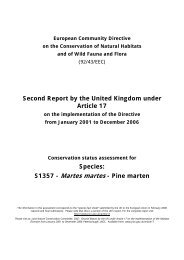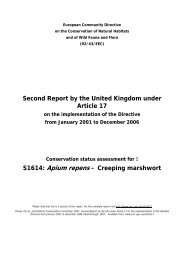UK Climate Change Programme 2006 - JNCC - Defra
UK Climate Change Programme 2006 - JNCC - Defra
UK Climate Change Programme 2006 - JNCC - Defra
You also want an ePaper? Increase the reach of your titles
YUMPU automatically turns print PDFs into web optimized ePapers that Google loves.
Business<br />
53<br />
47. In November 2004, six leading companies restated<br />
their commitment to the <strong>UK</strong> ETS by offering an<br />
additional 2.4 MtC emissions reductions relative to<br />
their baselines by <strong>2006</strong>. This helped to reduce the<br />
overall surplus of allowances in the market and to<br />
keep the scheme on track. In considering the<br />
future policy mix (see paragraphs 11 and 53) the<br />
Government will take full account of the<br />
experience gained from the voluntary <strong>UK</strong> scheme.<br />
48. Site closures and other changes of operation are<br />
factored into annually amended baselines. Figure<br />
1 shows planned and actual emissions reductions<br />
due to the scheme.<br />
Direct Participants’ planned and delivered reductions in<br />
emissions levels<br />
Reduction in emissions levels due to<br />
the Scheme (MtCO 2e<br />
)<br />
7<br />
6<br />
5<br />
4<br />
3<br />
2<br />
1<br />
0<br />
2002 2002-<br />
2003<br />
Actual<br />
2002-<br />
2004<br />
2002-<br />
2005<br />
Planned<br />
2002-<br />
<strong>2006</strong><br />
49. Participants have gained valuable experience in<br />
developing emissions reduction strategies as well<br />
as learning about the mechanics of trading and<br />
how to monitor, report and verify their emissions.<br />
The Government has also learnt valuable lessons<br />
from the development of the scheme, notably the<br />
importance of incorporating emissions projections<br />
into baseline setting, to ensure “real and<br />
additional” emissions reductions, and the fact<br />
that trading has delivered more emissions<br />
reductions than expected.<br />
50. The <strong>UK</strong> ETS has given <strong>UK</strong> business a ‘first-mover<br />
advantage’ on the global carbon trading market.<br />
Companies providing emissions trading services,<br />
such as brokerage and verification, have gained<br />
experience that places them in a strong position<br />
as EU and international emissions trading<br />
develop. In addition, the <strong>UK</strong> Emissions Trading<br />
Registry (ETR) has been adapted for use in the EU<br />
scheme and the <strong>UK</strong>’s EU/UN registry has now<br />
been licensed to 16 other countries.<br />
51. In the Pre-Budget Report 2004, the Chancellor<br />
announced that <strong>Defra</strong> and HM Treasury would<br />
jointly sponsor a review into innovation in energy<br />
efficiency. The purpose of the review was to<br />
examine how a step-change in energy efficiency<br />
in the domestic, business and public sectors in<br />
the <strong>UK</strong> could be delivered cost-effectively and<br />
how energy efficiency improvement could be<br />
embedded into decision making across the<br />
economy. A summary of the principal conclusions<br />
of the review was published alongside the Pre-<br />
Budget report in December 2005. The Carbon<br />
Trust and the Energy Saving Trust published<br />
detailed, independent reports to Government at<br />
the same time.<br />
52. The Carbon Trust concluded that there is<br />
significant scope for cost-effective energy<br />
efficiency and emissions reductions in large nonenergy<br />
intensive businesses and public sector<br />
organisations. It put forward a proposal for a<br />
new, mandatory auction based <strong>UK</strong> emissions<br />
trading scheme, which would not be linked to<br />
the existing voluntary market, that would target<br />
energy use by large non-energy intensive<br />
businesses and public sector organisations not<br />
covered by the EU emissions trading scheme or<br />
climate change agreements.<br />
53. The Government is considering the proposal,<br />
which raises some important issues, and will<br />
decide in due course whether to take it forward.<br />
As well as exploring the potential environmental<br />
benefits of such a scheme, we will also examine<br />
the impact of such a scheme on different sectors,<br />
including implications for regulatory burden and<br />
competitiveness. We will also consider whether it<br />
would be consistent with the Government’s<br />
Better Regulation principles.<br />
Small and medium-sized businesses<br />
54. The Carbon Trust launched a pilot Energy<br />
Efficiency Loan scheme for SMEs in 2002. It


